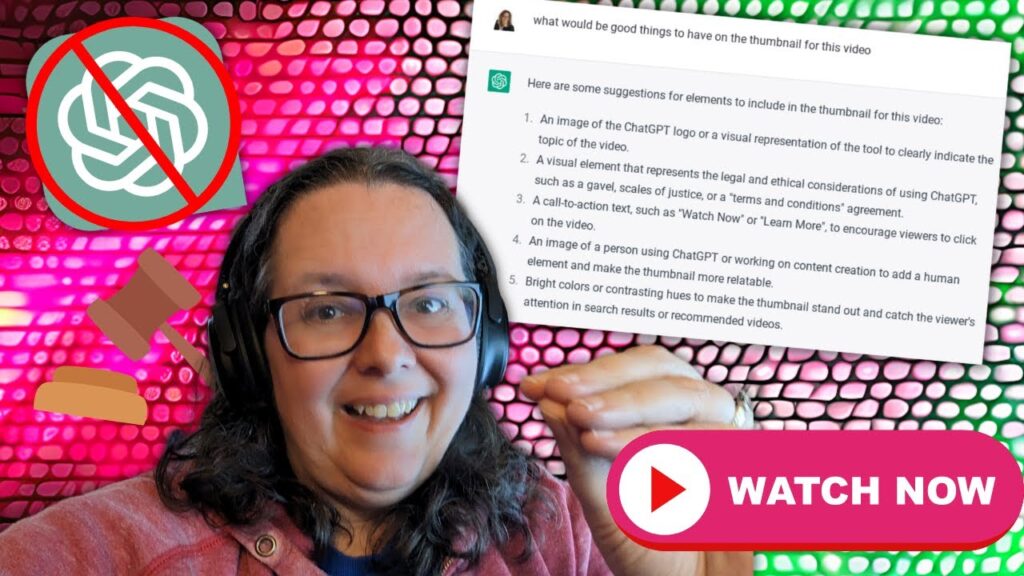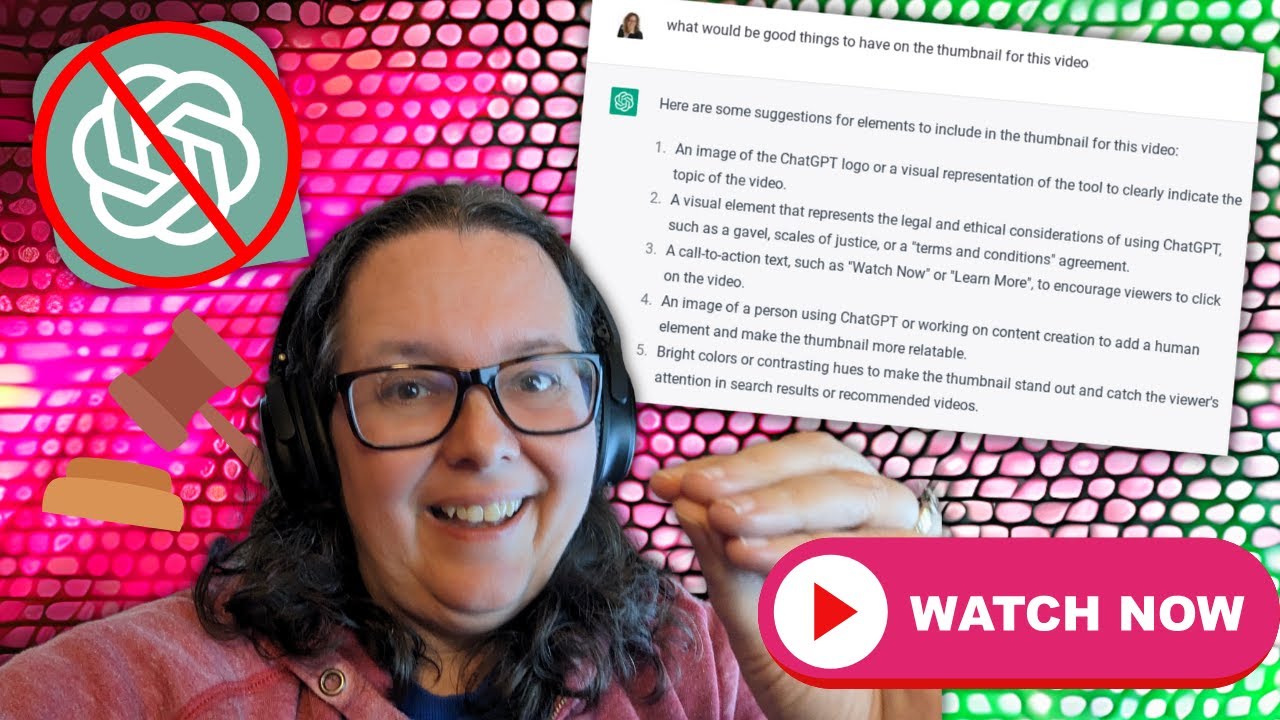In the video “Understanding the Legal and Ethical Implications of Using ChatGPT for Content Creation” by Dr. Marie Haynes, she discusses the recent change in OpenAI’s terms of service (TOS) that aims to be more developer-friendly. Dr. Haynes explores various topics related to using ChatGPT for content creation, such as disclosure requirements when rewriting content, ownership of the content created, risks of plagiarism, personal experiences in using ChatGPT to improve writing, responsibility of content creators, usage of content by OpenAI, the importance of providing feedback, submitting copyright complaints, and the use of OpenAI and Chat GPT’s logos in content. This comprehensive video sheds light on the legal and ethical implications of utilizing ChatGPT, providing valuable insights to content creators looking to optimize their work using this popular tool.
Dr. Haynes’ thorough exploration of the TOS changes and the implications of using ChatGPT for content creation offers significant guidance and perspectives for content creators seeking to leverage this tool while abiding by legal and ethical standards. With a focus on disclosure, ownership, plagiarism risks, and responsibility, this video serves as an informative resource for those looking to navigate the legal and ethical landscape associated with utilizing ChatGPT in their content creation processes.
Using ChatGPT for Content Creation: Understanding OpenAI’s TOS
OpenAI recently made updates to their Terms of Service (TOS), aiming to make them more developer-friendly. These changes have sparked discussions about the implications of using ChatGPT for content creation. In this article, we will explore the key points addressed in the updated TOS and shed light on important aspects such as disclosure requirements, ownership of content, risks of plagiarism, personal experiences, responsibilities of content creators, OpenAI’s use of content, the importance of providing feedback, submitting copyright complaints, and the use of OpenAI and ChatGPT’s logos in content.
Disclosure Requirements
When using ChatGPT to rewrite content, the updated TOS raises the question of whether one needs to disclose that they have used the tool. The interpretation of this requirement varies, but generally, it is not necessary to disclose unless ChatGPT is the primary source used to create the content. For example, if you rewrite your own content using ChatGPT to optimize it and include it in your published work, disclosure might not be necessary. However, it is always advisable to review the specific terms and requirements of the TOS to ensure compliance.
Ownership of Content Created
According to OpenAI’s updated TOS, as a user of ChatGPT, you own both the input and output generated by the service. OpenAI retains the right to use the content as necessary to provide and maintain their services, comply with applicable laws, and enforce their policies. As a content creator, you are responsible for ensuring that your content does not violate any laws.
One of the concerns associated with using ChatGPT for content creation is the risk of unintentional plagiarism. While using the tool to rewrite your own content, it is essential to ensure that you retain your unique voice and avoid accidental plagiarism. By reviewing and verifying the rewritten content, you can maintain the authenticity of your work before publishing it.
Risks of Plagiarism
Plagiarism is a significant concern when using AI-driven tools like ChatGPT for content creation. The nature of machine learning may lead to outputs that are not unique across users. OpenAI acknowledges this possibility and mentions that the services may generate similar or identical outputs for different users. This serves as a reminder to exercise caution when using the tool and to take proactive measures to avoid any inadvertent infringement on others’ work.

Personal Experience of Using ChatGPT for Writing
Using ChatGPT for content creation can be a valuable experience, helping writers improve their work through AI-driven assistance. Many content creators have experimented with using ChatGPT to optimize their writing. By rewriting content or seeking clarification on specific points, writers can enhance the overall quality of their work. However, it is crucial to always review and edit the AI-generated content to ensure accuracy and maintain the writer’s unique style and voice.
Responsibility of Content Creators
As a content creator utilizing the OpenAI API, it is essential to understand and fulfill your responsibilities. OpenAI’s TOS emphasizes that content creators are responsible for their content and ensuring compliance with the law. This means taking care to avoid infringing on copyrights, using the tool responsibly, and verifying the accuracy and legitimacy of the generated content. Content creators should strive to maintain integrity and ethical standards in their work.
Use of Content by OpenAI
OpenAI assures that they use the content provided or received from the API only to provide and maintain their services. While they may use content from services other than their API to improve their offerings, content created using ChatGPT specifically for the API does not contribute to enhancing the service itself. This distinction emphasizes the importance of providing feedback to ChatGPT separately, as it helps OpenAI improve the overall performance of the model.
Importance of Providing Feedback
Providing feedback on the outputs generated by ChatGPT is an essential aspect of improving the AI model. Whether the response is exceptional or subpar, feedback helps refine the system and ensure its continuous development. Clicking on the feedback button allows users to provide valuable insights that can shape future iterations of ChatGPT. By actively participating in the feedback process, content creators contribute to enhancing the capabilities and accuracy of the tool.
Submitting Copyright Complaints to OpenAI
OpenAI explicitly acknowledges copyright concerns in their TOS. If users come across generated content from ChatGPT that infringes upon their copyright, they have the option to submit copyright complaints to OpenAI. This provision ensures a mechanism for protecting original work and addressing potential violations, enhancing user trust and safeguarding intellectual property rights.
Use of OpenAI and ChatGPT’s Logos in Content
Content creators should be aware that using OpenAI’s names, logos, or trademarks in their content may not be permissible without explicit authorization. While the use of logos in social posts or articles might seem common, it is important to differentiate between general discussion and commercial use. Commercial products or services where OpenAI’s logo is used would likely require authorization to ensure proper usage.
Conclusion
OpenAI’s updated TOS provides greater clarity on various aspects concerning the use of ChatGPT for content creation. It’s crucial for users to understand disclosure requirements, take ownership of their content, and be mindful of the risks of plagiarism. Personal experiences of writers using ChatGPT can be valuable, but content creators should exercise responsibility and ensure their content complies with laws and ethical standards. OpenAI emphasizes the importance of feedback and provides a mechanism for addressing copyright concerns. Lastly, proper usage of OpenAI and ChatGPT’s logos and trademarks is essential to maintain commercial integrity.
By staying informed and adhering to the guidelines outlined in the updated TOS, content creators can make the most of ChatGPT while ensuring legal and ethical practices in their work.
